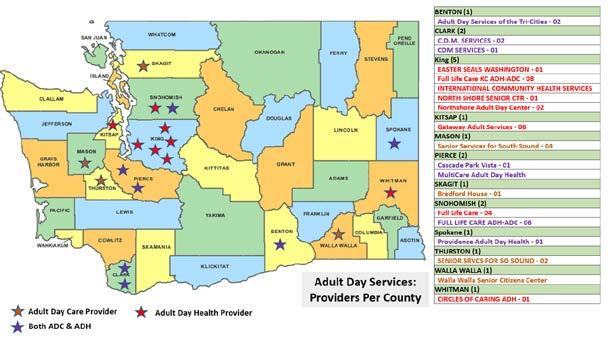HCS Highlights
WINTER 2023





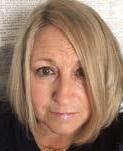
With the legislative session in full swing, it is a perfect time to pause and prepare for 2023. Building a cohesive leadership team is vital to me because you all must be informed and get clear information about the things on our radar this coming year. In late February, your leadership will come together for a full day to focus on setting clear objectives and goals for us all. HCS has over 1,250 employees who support numerous programs and services, all going full steam and in different directions. It is a priority for me to support this work and communicate across the division what our objectives and goals are for 2023. Other organization-wide goals for HCS include, but are not limited to:
HCS will use new positions under Money Follows the Person to prioritize outreach and navigation, encouraging people to caregiving. In addition, we will continue to work with the Associations and stakeholders to address concerns and prioritize our efforts. Additionally, we will continue to expand continuing education training offerings in CareLearn and expand these training offerings to include the Developmental Disabilities Administration.
HCS will continue to work closely with our human resource partners regarding statewide recruitments and crafting compelling job postings. This past year we’ve done tremendous work reducing the number of vacancies, seeing positive results in all three regions and headquarters. In addition to increased staffing, I’ve also sponsored a workgroup to investigate our current service delivery system and make recommendations. The workgroup findings will help our team complete in-home initial assessments timely and transfer cases sooner. This may also increase the use of appropriate, person-centered, nonpersonal care services and assistive technology for HCS clients.
President Biden recently announced that on May 11, 2023, the public health emergency would end. So we will have lots of work to unwind the federal flexibilities we have been working under since 2020. HCS will continue to work with the Centers for Medicare and Medicaid to ensure minimal impacts on clients during the public health emergency unwinding activities starting in April. Our team will ensure that waiver and state plan amendments are submitted to support the flexibilities we plan to retain. We are also committed to providing staff with training on any proposed changes.
In 2023, we will increase our efforts to seek and include feedback from clients, particularly under-represented and BIPOC communities, in developing programs and policies. One outcome could be a stakeholder tracking dashboard to ensure stakeholders are identified and invited to participate in all proposed policy changes.
By the end of this fiscal year, over 200 HCS staff are eligible for retirement, just over 16 percent of our workforce. In some units, that number is considerably higher. As we plan for the increase in the aging population from a client perspective, we must do the same for our division’s workforce. We must find ways to support and develop our upcoming leaders, create additional supports for unit managers and encourage mentoring and job development opportunities wherever possible.
With adequate funding and support, some of these priorities could be protected. We must remain agile and responsive to bill analysis and fiscal note requests during the legislative session. HCS is also prioritizing a legislative request for raising our clients’ residential and personal needs allowance. Stay tuned as this works its way through the 105-day 2023 legislative session.
As always, thank you for all you do in supporting the critical work of the Aging and Long-Term Support Administration, and more specifically, Home and Community Services. It takes every team member to accomplish our priorities and mission.

The Region 1 CFD was full of gratitude, cuteness, and prizes. Led by EDAI Program Manager, Pakou Lee, the volunteers in region one collaborated to provide fun and interactive events in our fund-raising efforts. These included: sending a “Gratitude-gram” to those we appreciate, a photo contest of our pets in Halloween costumes (the winner is shown below), fall photo contest, and a Mystery Box full of all things Autumn. The winner taking home its contents. The proceeds of the Combined Fund Drive went to support the Spokane Humane Society and the American Red Cross.

Region 1 North RSW team in Spokane enjoyed a festive winter holiday party that incorporated learning activities for the group as well as amazing team-building and fun activities, along with good food. The 4 RSW teams built gingerbread houses that leadership “judged” for various fun and creative themes. It was truly a delight to see and hear the smiles, laughs, and music as the group enjoyed some much-deserved down-time that supported crucial team building.
 Tami Rucker, Region 1 Administrator
Tami Rucker, Region 1 Administrator
Region 1 South Union Gap ALTSA office that houses HCS, RCS, and APS put on a Holiday Party that enjoyed food and a Silent Auction to raise money for a local charity (Rod’s House). Rod’s House assists homeless youth and offers behavioral health services in the Yakima area. The Silent Auction was very successful in raising $1021 dollars for Rod’s House and all had a great time bidding against each other!
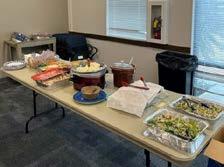

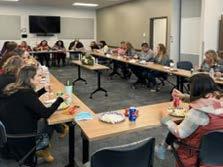
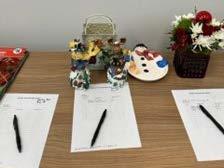

Region 2 word of the year for 2022 was resilience. R2, we are resilient. We never give up on one another and assist clients with the best service we can provide. We promoted 19 employees and hired 109 new employees. We implemented enhanced in-take for all R2 and included more I & R. This has been a game changer in how we process intakes.
Bronwyn Freer, Social Service Program Manager, retired, and we hired Peter Hinze as the new PM. At home, the staff is dealing with provider shortages and holding on to cases longer than expected. Still, they are real heroes, and I am very proud of them. In-home units hired 3 NCCs. They assisted the ACH teams and helped RCCM teams with conversions.
We added five new units to social services. 1 Acute Care Hospital team, 2 Residential Care Case Management teams, a Behavioral Health Personal Care team, and an in-training unit.
Our training team is terrific. They had to reconfigure trainings from in-person to virtual. This includes doing staff shadows of client assessments. They facilitated three series of Applied Practice trainings and trained over 60 new staff.
Our Behavioral Health teams continue to work hard with WSH clients. They had 57 discharges from WSH and 98 WSH diversions. Our resources development team had 1601 referrals. This team assisted their peers in finding appropriate residential facilities for clients.
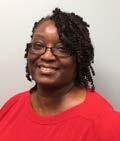
RCCM employees did 592 initial assessments, 3152 annual assessments, and 2422 bed holds.
Our PBS staff processes over 8000 requests for benefits. Caseloads of over 500 clients and still maintain excellent QA results. Go PBS!
Acute Care Hospital onboarded 17 new employees and completed over 950 assessments.
We graduated 16 employees from our Leadership Development program.
Our customer service units continue to support our internal and external customers with a smile.
NFCM received 3290 intakes, completed 1335 assessments, and had 780 discharges.
Erin Klones, DRA, put together an outstanding PowerPoint which outlined R2 2022 year in review. Thank you, Erin.
As you can see, R2 is resilient. And we will forge ahead in 2023.
Sonya Sanders, Region 2 Administrator

We are wired for generosity and kindness. The benefit of generosity, kindness, and support is a triple win that helps everyone as:
• Showing and giving kindness benefits the giver,
• Receiving kindness benefits the receiver,
• Witnessing kindness benefits the witness. (Davisdon, 2022)
I want to thank those who have stepped up to offer generosity, kindness, and support to our Region, other offices within our Region, and their co-workers. There is no way to capture ALL the hard work and support provided over the past year in this short article. This is just a tiny glimpse of the teamwork we have witnessed. Thank you to:
Region 2 Intake generously allowed two full-time Intake staff to help our Intake team catch up! Region 2 also had volunteers to do overtime to assist with our intake backlog! We are so grateful for the help and support from the wonderful Region 2 team!!
Our Intake team has seen skyrocketing numbers and loss in staff and supervisors but stay resilient and persevere! They have continued to work fast and furiously to catch up and have worked overtime to manage the high volumes of work.
Our clerical teams have helped with Lexis Nexus reports, worked on default and mystery mail, provided hiring support to our supervisors, and provided mailing support to our social services teams to ensure our clients receive the best possible service. We could not do what we do without you!
Our Public Benefit Specialists (PBS) who were able to remain calm and effective while under stress due to the Intake backlog and carrying caseloads in the 400s.
Knowing Intake was struggling with the increased number of referrals, our PBS staff quickly jumped into action by assisting with screening in their assistant units. This creative solution helped alleviate some of the burdens of Intake. It demonstrated their outstanding teamwork and dedication to our vulnerable clients.
Our North area social services teams (Port Angeles and Tacoma) for their teamwork and support in assisting each other to reduce caseloads. Both offices went above and beyond, completing countless assessments for other offices throughout the Region. Port Angles recently took on 90 additional cases from another office. This support was crucial in making sure our clients received timely assessments!
Our Central area social services teams (Tumwater, Aberdeen, Shelton, and Bremerton) have gone above and beyond to help the Shelton and Bremerton offices, who were hit particularly hard with staff shortages and high intake volumes while dealing with their staffing shortages. This team supported and crossed over to help other offices and programs to ensure we met our client’s needs!
Our South area social services teams (Vancouver and Kelso) have sustained the longestrunning staffing shortages in our Region. This team has managed for an extortionary length of time under the stress of high caseloads and very few staff to do the work. Residential went into the full-time rotation twice for eight months to support the inhome team. These offices showed exceptional teamwork and support by stepping up to help each other meet the needs of our clients!
Our NFCM team regionwide have been supportive and generous with their help! Offices supported other offices by taking on additional facilities due to staff vacancies. The NFCM team has helped with in-home assessments, file reviews, and transfers throughout the Region. The SME team has also helped with WSH and hospital referrals and taking on inhome assessments. They have continued to volunteer for overtime to help with struggling in other areas.
Our RSW team persevered through high caseloads and staffing shortages regionwide, particularly in the Tacoma area. Region-wide offices have supported each other by helping each other with intakes, providing coverage when another went on leave, and stepping in to do in-person assessments when someone was sick. They also supported each other by being available for questions and supports on work processes. Great teamwork!
Our SHPC teams onboarded 107 new employees in 2022, a record number. On top of that, the social services team took on new innovative projects such as the OneNote Lean Project, the Stat Tracker Workgroup, and the CDWA Implementation, which spanned over nine months. Both Financial and Social Service SHPCs have regularly supported the offices’ workload by doing overtime to help with intake, carrying caseloads, and helping with supervisor transfers. They continually go above and beyond in their support of the Region.
Our regionwide management team has supported each other and helped each other manage high volumes of work, filling in coverage gaps, interviewing, hiring, tracking, onboarding, and training 88 new SSS3, NCC, and PBS4 employees in 2022. Our supervisors have and continue to carry entire caseloads due to staffing shortages while doing their other duties and onboarding and training new staff. Our supervisors provided incredible support to their teams as well as each other!


The new edition of the Fundamentals of Caregiving, the core training textbook for Home Care Aides in Washington, went live in June 2022. Since then, it has sold nearly 2000 copies, and trainers and caregivers have received it well. As Diane Dea from the Muckleshoot Indian Tribe Elders in Home Support Services said: “We like the 3rd Edition Fundamentals of Caregiving. It has enhanced our teaching/student experience.”
The Training, Communications, and Workforce Development unit of Home and Community Services is proud to make the Fundamentals of Caregiving available in 13 languages on our curriculum website . The new edition includes chapters on person-centered care and cultural competency, as well as updated content and design. In addition to the textbook, the update project produced an instructor’s guide, lesson plans, and presentation materials to support community and facility instructors.
Samuel Cooke of the Training Development and Learning Management team is engaging subject matter experts, tribal partners, state stakeholders, community and facility instructors, and community voices to redevelop Orientation and Safety Training for home care aides. If you have any questions or suggestions, don’t hesitate to get in touch with Sam at samuel.cooke@dshs.wa.gov.
Do you have some news or information you’d like to share with your HCS colleagues? Let Interim HCS Communications Manager Cynthia Shipley know!
Here’s what I believe I know about you. You show up, do hard work, and make a difference. Our success as individuals, an organization, and an entire service delivery system depends on each one of us doing this every day, in every interaction. Thank you for being your authentic self and choosing to serve in ALTSA. Public service is an honorable calling. If you are here, it means you share our values and mission, which fills my heart with joy and camaraderie. We are in this together! And part of being in this together means we take care of ourselves and each other.
We are doing many things to help care for each other in ALTSA.
We have fully embraced hybrid work, maximizing telework and flexibility wherever possible. While ensuring our service needs are consistently met with the highest degree of quality because the people we serve deserve nothing less than the best (that’s you!). You deserve a good work/life balance in the process.
We have increased our focus on wellbeing throughout the pandemic and beyond. We offer free Focal Point sessions on topics such as Resiliency, Mental Health, and Preventing and Overcoming Burnout. We have created the monthly Wellness Note to offer support every month on each of the 12 dimensions of well-being.

We have ensured wellbeing is a part of our leadership conversations. We are establishing and teaching others how to create psychological safety, navigate change, manage time, and promote a true sense of belonging. All are essential to our inclusion efforts and help us be an Employer of Choice for years to come.
Even as we work on these well-being efforts as an organization, reaching real success requires taking care of ourselves. As we move into 2023, here are some things you can do right now:
Carve out time on your calendar for daily planning and prioritization, and try some of these templates to help you manage your workday and wellbeing goals
Come to the ALTSA Thrives Connection Café (or any other Café that excites you)
Read the monthly wellness note and commit to trying new things
Reach out and connect with others in person, on a Teams call, or send a RAVE review. Check out SmartHealth, sponsored by the Governor’s office.
Remember you are not alone, and you are always encouraged to utilize the Employee Assistance Program if additional support is needed.
Here is a video that inspires me and reminds me of my power to make daily choices that support my wellbeing. I hope it does the same for you. (Note, not an endorsement of any business) Thank you for taking good care of yourself as part of our wellbeing journey in ALTSA.
 By Michelle Joseph, ALTSA EDAI Administrator
By Michelle Joseph, ALTSA EDAI Administrator
It was a Sunday afternoon just before the pandemic, I was driving by myself from Seattle to Spokane to provide a training on EDAI. I recall it being a very long day. I turned on my music to zone out, relax, and enjoy my road trip. Suddenly, there was a siren that caught my attention. No matter how much I desired to stay in my zone, I had to pull over for Mr. Officer to explain to me the problem. I wasn’t aware of what I had done. I had to zone in to discover, I was speeding. I had no idea how fast I was going. Of course, fear set in because I had never been pulled over by the police. This was my first ticket in 47 years of living! I learned that I could zone out and pay attention to where I am in the moment for my own safety and the safety of others. I didn’t get upset with Mr. Officer or make excuses because I knew I was in my own zone. When he asked if I knew how fast I was going, I said “No, I was in a zone!” Mr. Officer said he appreciated my honesty, he empathized with me, and gave me a ticket! I was fearful, I learned something, and I had an opportunity for a growth mindset.
No matter how fearful you may be around the topic of EDAI, we are here to appreciate your honesty, empathize with you, and give you a ticket to journey with us, your ALTSA EDAI Team. Topics around EDAI can be intense, I invite you, to zone in, have empathy, and grant a ticket of GRACE and GROWTH for yourself and others.
Pakou Lee pakou.lee@dshs.wa.gov
Morgan Olson morgan.olson1@dshs.wa.gov Derrick Ross derrick.ross2@dshs.wa.gov Claire Knight claire.knight@dshs.wa.gov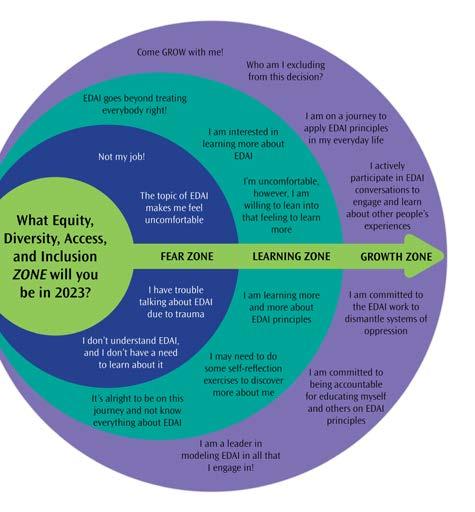

DRIVE pro-equity and social justice for all.
CENTER racial justice.
ENSURE equitable access.
BUILD a culture of belonging.
END disparities, including racial and ethnic disparities, to achieve equitable outcomes. We will convene teams of employees and communities to prioritize hiring and promotions; state spend for public works, goods, and services (including client services), and procurement; and access to services.
What sort of duties do you have at work?
HCS Headquarters’ new Office Chief for Home and Community Programs, Maren Turner, joined the team December 19, 2022.

Maren Turner is an accomplished leader with over 30 years of experience in strategic planning, building dynamic teams, and advocating for progressive issues at the local, state, and federal levels. She brings a wealth of experience in C4 and C3 landscapes and in-depth expertise in building infrastructure that operationalizes racial equity, centers BIPOC communities, and is rooted in socioeconomic justice. Maren continually develops mentorship, capacity building, and trust in the teams she leads.
Where did you work before this position?
I most recently worked at a small nonprofit that provided voter related data and research to partners and campaigns focused on social justice. Prior to that I held various positions at AARP at the national, regional and state levels. I simultaneously taught graduate classes in gerontology at a medical school (functional changes and aging, diversity and aging, social policy and aging).
My job focuses on planning and policy development for Long Term Care Services and Supports (LTSS) for older people and people with disabilities. I coordinate with other divisions inside and outside of ALTSA to promote choice, independence, safety, and culturally competent services for the people we serve.
What’s the most exciting part of your job?
I am most excited about collaborating with people to develop and impact policies that make a difference. It is fun and challenging to build relationships with a new set of people!
What motivates you at work?
For me, a new solution to an old problem is always right around the corner. I am motivated to find it!
Do you have any mentors in your professional life?
I believe mentors and sponsors make a positive and invaluable impact on your career, no matter where you function in the chain of command.
I mentor and am mentored by research, academic, and/or gerontology practitioners. I currently have an ALTSA mentor, Barb Hannemann, who is available to me until she retires in June!
What’s the best place you’ve traveled to?
So far, the best places I have traveled to are (1) Rio de Janeiro—OMG the Rainforest and relaxed culture (2) Santa Fe, NM—the food and art markets are overwhelming, and (3) Washington state!! I have been here less than 2 years and I
Maren and her dog, Jacksonsometimes feel like a traveler. We started out in Tacoma, moved to Puyallup and then to Lacey Olympia! Living in WA has been the best place I have ever lived. I LOVE it here.
What’s the best book you’ve read recently?
Oh my-- I am one of those people who seems to read several books at one time, which means it takes me a while to get through one! The last book I completed was The Vanishing Half by Brit Bennett as part of a Howard University Book Club assignment. I am currently reading Parable of the Sower by Octavia Butler, and Nudge by Richard Thaler (I am a huge fan of behavioral economics).
What’s something you’re proud of?
I’m not sure proud is the right word to use here but I am happy to have had the opportunity to save someone’s life. When I was a LTC ombudsman, I was responsible for finding unlicensed board and care homes. I heard about one in DC but could not get into the house, so I had to do some creative things to gain entry. Once inside, I found a man who was living in a dark and padlocked room, covered with lice, underweight (<100lbs) and forced to each his own excrement for nourishment. I am happy to have been instrumental in having the man transported to a hospital and the unlicensed home shut down.
What’s your favorite food?
My favorite cuisine is Mediterranean. While I don’t eat a lot of meat, I am especially fond of the many chicken and fish dishes.
Are you a coffee or tea person?
I am a (hot) tea person, though I seem to be addicted to Thai iced tea! I once took a tea clinic in Beijing—that is how much I love tea!! I especially like any opportunity to participate in Afternoon Tea with my all-time favorite places being the Nelson Atkins Museum in Kansas City, Four Seasons Hotel in
Washington, DC, and this great place my sister-in law took me to in Singapore.
Have you ever met anyone famous?
I have met several famous people, including Myrlie Evers-Williams. She came to Dallas for a book signing and I was part of the group!
If you could have a career in anything, what would it be?
My career, working with and advocating for people across the lifespan, is exactly what I would choose if I had it to do all over again!! It has always been important to me to be helpful and to make and impact policies that transform lives.
How would your friends describe you?

My friends will tell you that I never turn down an adventure. I am always open to learning something different or traveling to a new place. I like to cook and passionately enjoy the arts, especially the performing arts! My superpowers are that I am a very good listener, strategist, and I can synthesize information once my inquisitive appetite has been satisfied. Most of all, I like to have FUN!!
What’s your idea of a perfect day?
Ha! Let’s just say a groovy day for me would be when I cross everything off my To Do list and feel my contributions are appreciated.
Maren and her daugher, Lexxi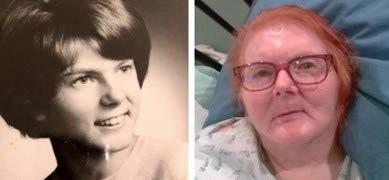
Extraordinary examples of caring & support within HCS are often overlooked by the enormity of the services we provide. This is not the case for Shareen Bowman. This story revolves around respect for a woman who defined her own terms of living. This story also reflects the value we have for our clients in deciding their fate.
Respect for a person’s right to dictate care often presents complex dilemmas for care coordination. The underlying goal of providing the best care possible shares an inherent, single deciding factor that the outcomes are not ours to choose. The determining factor for Shareen Bowman was based on meaningful conversations from a caring team devoted to supporting her ultimate decision to allow Hospice care at a critical juncture of recovery versus acceptance. This portrayal of Shareen’s decision is based on multiple care providers and family who participated with her journey towards end-of-life care. Sharing this story is an opportunity to celebrate Shareen’s independence in thought and action as well as addressing the need for a shift in perspectives when confronted with complex medical and psychiatric coordination of care.
Shareen’s story requires acknowledging that she was an exceptionally independent person who experienced numerous emotional and health struggles throughout
her life which was complicated by difficulties forming meaningful, trusting relationships. Despite these concerns, Shareen’s perseverance allowed her to remain independent in the community until she experienced her first major psychotic episode at the age of 67. This life altering event required extensive psychiatric stabilization which resulted in a Western State Hospital admission. The lengthy hospitalization of almost two years identified that Shareen had multiple physical & psychiatric concerns that required significant supports. The most predominant psychiatric concern was Shareen’s persistent paranoid and persecutory delusions that raised questions about her judgement. This required the interventions of a caring WSH Discharge Planning Team who were instrumental for bringing Sunrise ESF into the conversation about the types of care available to support her transition from WSH. Shareen was able to dispel any cognitive concerns by accurately identifying likely outcomes associated with her decisions, recognizing that she was dependent on assistance managing her ADLs and mobility, and relied on effective behavior interventions to maintain her emotional stability. Shareen ultimately agreed that Sunrise ESF was a better solution to returning home which would of likely exposed gaps in care that she wanted & needed.
coordinated with Shareen, her daughters (Guardians), & the WSH discharge team to target the development of a medical & psychiatric support plan that incorporated the need for extensive nursing care for the emerging medical concerns involved with immobility. This was a delicate, on-going discussion between the ESF staff, her RSW case manager, Shareen, and her daughters to ensure that all options of care were openly discussed. These discussions were also mindful of the importance of trust, respect, and dignity and also also took into account the complexities of providing effective interventions for mitigating behavioral concerns that often interfered with her personal care. This ESF was able to adapt their level of care for Shareen’s unique care needs & responded accordingly when her status worsened over time. They also never faltered in being non-judgmental about Shareen’s choices which allowed for a greater sense of trust between provider and Client. Hospice care was eventually introduced as Shareen began to evidence failure to thrive.
In most circumstances, Shareen’s care needs would typically exceed ESF level of care & would necessitate a transfer to a higher level of care facility. Sunrise staff was able to incorporate extensive medical care & psychiatric supports that allowed Shareen to age in place. This was an incredible effort by the staff of Sunrise ESF who addressed the complications of pain management, wound care, and comfort that allowed Shareen to maintain an extraordinary sense dignity and independence.
The brilliance of how this story evolved is that Shareen created the direction of her passing. She allowed a dedicated team to develop a plan of care that recognized her independence in choice. Later conversations with the ESF staff, her RSW case manager, and her family revealed the recognizable sense of trust Shareen expressed for the support she received. Additionally, the ESF administrator later acknowledged that other residents found that this experience created a greater sense of belonging and appreciation that the staff supported Client self-directed care. Shareen’s daughter expressed immense appreciation for the care her mother received and cited that her mother’s passing was pain-free and without the fear of being alone. Shareen’s daughter also was specific in her gratitude for the existence of DSHS services. She cited that this type of supportive behavioral care in this type of setting was exceptional, and this experience revealed a working model to support others like her mother who would of otherwise remain isolated, homeless, and in pain. Shareen’s daughter expressly thanks the staff of Sunrise ESF, her mother’s RSW Case Manager, and DSHS for supporting her mother through the final days of her mother’s life.
This story came to my attention as a result of exploring options to support medically fragile individuals who were residing in ESFs. Traditionally, Clients with extensive physical, medical, and behavioral concerns had no choice in their care options which were confined to either acute hospital or skilled nursing facility level of care. This was not the case for Shareen Bowman. I was able to find in my review and discussions with the ESF administrator, RSW Case Manager, and Shareen’s daughter that there was ample evidence to indicate Shareen’s care needs were met and that Shareen’s care plan was carefully orchestrated around the simple facts that Shareen felt safe, supported, and in charge of her care. The power of this story is not only emotional but affirming that our shared commitment to the best level of care is possible. Shareen was able to avoid transitioning into another setting or experience the isolation or fear that was inherent to her delusions. This is a true representation that this type of service and setting creates a working model of providing positive, supportive outcomes without being restrictive or invasive. This is also a reminder that this story supports our shared belief that Client-centered care is possible through diligence and thoughtfulness that would be otherwise lost to outdated models of care. It was Shareen’s daughter who expressed the hope that this story can be replicated for other people who are living lives similar to Shareen.
Adult Day Services (ADS) are daytime programs that provide clinical and non-clinical services to participants to address their unmet needs. ADS aims to assist participants with their activities of daily living (ADLs) while maximizing their independence and supporting them to live independently in their communities or residences. ADS programs can either be Adult Day Care (ADC) or Adult Day Health (ADH).
ADC is a daytime program that provides core services for adults with medical or disabling conditions who do not require nursing assistance or intervention.

Services include assistance with activities of daily living, social services on a consulting basis, routine health monitoring, and general health education and group based therapeutic activities. Adults get to take part in recreational or social activities and may also receive nutritional meals and snacks. A shower can also be provided along with some personal ADLs while at the center.
Although transportation is not provided for ADC programs, they may be able to assist the client in finding local transportation resources to and from the facility for participating adults.
Who is eligible for ADC?
Someone who:
• Has a current assessment in CARE
• Is enrolled in COPES, RCL, New Freedom, or other approved funding, and
• Has an unmet need for one or more of the following core services:
- Personal care services
- Health monitoring with consultation from an RN
- General therapeutic activities
- Supervision or protection
- Lives in an in-home setting
ADH is a supervised daytime program providing skilled nursing or rehabilitative therapy in addition to the core services offered at ADC.
ADH services are appropriate for adults with medical or disabling conditions who require the intervention or services of a Registered Nurse or licensed rehabilitative therapist on each day of attendance.
The client can also receive intermittent supportive counseling.
ADH provides skilled nursing or rehabilitative therapy in addition to the core services offered at ADC.
All core services within ADC and
• Skilled nursing services
• Restorative, rehabilitative
• Skilled therapies: physical and occupational therapy, speech-language pathology, and audiology
• Supportive counseling services, case management
• Client transportation is included in the daily rate
• No adjustment to CARE hours
• Someone who:
• Has a current assessment in CARE
• Is enrolled in COPES, RCL, new freedom, or other approved funding
• Has an unmet need for one or more of the following:
- Skilled Nursing
- Skilled therapy
- Counseling
• Lives in an in-home setting, assisted living facility, or adult family home that does not offer the needed service(s)
There are currently 15 ADH providers in 10 Washington counties, including Benton, Clark, King, Kitsap, Pierce, Snohomish, Spokane, Lewis/Mason/Thurston, Skagit and Whitman.
For more information about ADS programs, please contact Susan Worthington, HCS ADS Program Manager.
